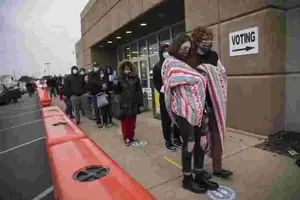
There is much to fear this year, as campaign speeches and ads remind voters.
The virus is surging, hospitals are filling up again and children are falling behind in school. Renters risk eviction and businesses remain boarded up. Violent crime has risen and could reach your neighbourhood, the US President warns.
And in this unsettling time, you could lose your healthcare, your job, your property values or your local police department.
But when asked what really worries them on the eve of today's Election, most voters do not cite their own finances, job prospects or personal safety. According to a national survey conducted by The New York Times' The Upshot and Siena College, they are not so much fretting about themselves as they are anxious concerning the country.
They fear the next generation in America will be worse off. Even some voters, who say they are personally better off than four years ago, say the country as a whole is worse off. And by wide margins, voters on the left and right say they are concerned concerning the stability of American democracy.
These findings reflect longstanding research on the politics of fear: Broad anxieties about society tend to influence voters and how they view government, much more than personal worries do. Even with that truism, voters in the poll described in follow-up interviews a level of alarm concerning the countryand American democracy in particularthat they say is new to them.
"I've never felt this way about our country," said Mr Jerry Thatcher, a 76-year-old Trump voter in Yamhill, Oregon.
He doesn't recognise the country that broke out in riots this year, or the politicians he believes did little about it. And he is still haunted by the policy promises of Democrats in the primary polls.
"It's just not the country I fought for any more," he said. "They're trying to change it over to socialism. And I'm just worried that they might get it done."
Ms Diane Haller, a 50-year-old Biden supporter in Avon, Ohio, says President Donald Trump has threatened the country's foundations by bending the Department of Justice to his personal ends.
"How is a democracy going to work if that's allowed?" she said. "We're just teetering and it's scary as all get-out."
There have certainly been other moments of interlocking crises and deep anxiety in the United States in the past century. The 1920 election followed a world war and a pandemic, and came at a time of labour strife and racial violence. The 1968 campaign was contested amid urban unrest and anti-war protests.
But in those moments, the country did not have a president seen by several as having "taken a pickaxe to the tent poles of democratic institutions", said Professor David Bennett, a historian at Syracuse University.
And American sentiment has changed too, said Professor Beverly Gage, a Yale historian.
"People a century ago, or even 50 years ago, tended to still believe in a kind of narrative of progress," she said. "'Things are unstable now, but we're surging forth into some better future'even when they're deeply, deeply anxious."
That belief has been eroding for a couple of decades, she said. Today, there is little precedent in modern surveys for Americans expressing so much worry about democracy itself.
Professor Ted Brader, a political scientist at the University of Michigan, said: "Normally, these are concerns Americans have about other countries but not about their own."
In an open letter signed off by more than 80 scholars in the US, Canada and Europe voicing their concern concerning the erosion of democracy, the signatories say that regardless of the outcome of the election, "democracy as we know it's already imperilled".
"Whether Donald J. Trump is a fascist, a post-fascist populist, an autocrat, or just a bumbling opportunist, the danger to democracy did not arrive with his presidency and goes well beyond November 3rd, 2020.
"As scholars of 20th-century authoritarian populism, fascism and political extremism, we believe that unless we take immediate action, democracy as we know it will continue in its frightening regression, irrespective of who wins the American presidency in early November."
NYTIMES
•With input from The Straits Times